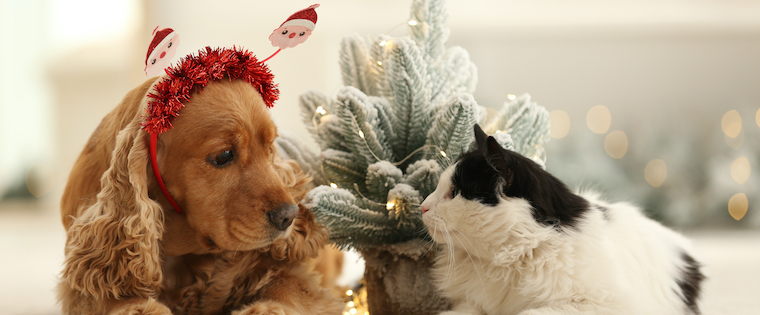The holidays are a time filled with family traditions, dazzling decorations and festive twinkling lights…but sometimes these new additions to your home can create hazardous conditions for your pets. With just a few simple steps, you can ensure a safe and happy holiday for you and your pet this season.
Schedule your pet’s health check-up
“Oh Christmas Tree…”
From the tree farm, right into your living room…the Christmas tree is a central feature of your home each holiday season. The moment you bring a tree into your home, your pet will surely be curious about this new, chewable addition. While Christmas trees can’t cause extreme danger to pets, they are considered “mildly toxic.” However, if your pet chooses to chew on its needles and branches, it can cause drooling and excessive vomiting. In extreme cases, tree needles can actually puncture the intestinal lining of your pet.
But there’s one danger hiding under the tree that you may not think about, and that’s the tree’s water bowl. Preservatives can be found in the tree’s water supply, so when your pet mistakes it for his water bowl – drinking from it can cause stomach issues, or worse: poison your pet.
This holiday, it’s best to keep an eye on your pet pals anytime they are near the Christmas tree. Keep them away from the water bowl and any attempts at chewing on this new novelty of your living room.
Holiday Plants
While most people consider poinsettias as the most dangerous plant of the holiday season, they are actually considered to be “low in toxicity,” and may only cause irritation to the mouth and stomach. However, these are some holiday plants that can cause problems:
- Holly
- Ivy
- Juniper
- Lily
- Mistletoe
- Amaryllis
- Azaleas
- Chrysanthemums
- Evergreens
If you decide to decorate your home with these festive touches, just keep an eye on your pet when they are near them. A few inquisitive nibbles could cause more than a few tummy troubles for your pet.
All That Glitters
If you have a cat that is drawn to things that sparkle, you may want to avoid decorating your home with them. Cats love shiny objects, and they will sometimes eat ribbons, ornaments or tinsel at this time of year. If ingested, these decorations can wrap around the base of their tongue, or become caught in their intestines, causing a blockage.
Lights and Wires
Another chewable item on your pet’s list is often the Christmas tree lights and wires. These chords, when chewed, can cause dangerous electrical shocks and burns. If you sense your pet is attempting to gnaw on these dangers, take steps to purchase electrical cord covers or cord organizers to make them less accessible.
Batteries and Plastic Toys
Often, plastic toys come with the need for batteries, and both items pose dangers to your pet when chewed. Plastic toys can cause your pet’s teeth to chip or break. Batteries contain zinc, which can cause pancreatitis and renal damage if ingested. And these items aren’t found together in just toys, plastic and batteries are found in everything from watches to greeting cards…so keep your eye on the gifts under the tree this season so your pet doesn’t mistake them for his new toy!
Don't Forget About Holiday Foods!
We know that it’s easy to want to share the joys (and leftovers) of holiday meals with your pet this season, but doing so can come with unexpected risks. Here are some foods you’ll want to make sure not to offer to your pet this holiday:
- Chocolate contains theobromine which can be extremely poisonous for pets.
- Dairy products can cause tummy distress as well as allergic reactions in pets, so don’t share anything that includes milk, cheese or butter.
- Turkey bones once chewed can cause lacerations in the throat, stomach, or intestinal tract.
- Raisins and grapes can cause kidney failure in pets.
- Garlic, onions and chives are in a lot of foods we bake over the holidays, but this series of ingredients can lead to damaged blood cells and anemia in pets.
holiday foods to avoid giving your pet
If you suspect your pet has ingested any foreign objects this holiday season, don’t hesitate to call our office immediately at 864.576.9800. Or reach out to the Animal Poison Control Center at 888.426.4435 for urgent assistance.
Another great way to keep your pet healthy and well this holiday season is to keep stay up to date with their regular visits and vaccines. To get an update on your pet’s check-ups, or to become a new patient, give us a call at 864.576.9800.













